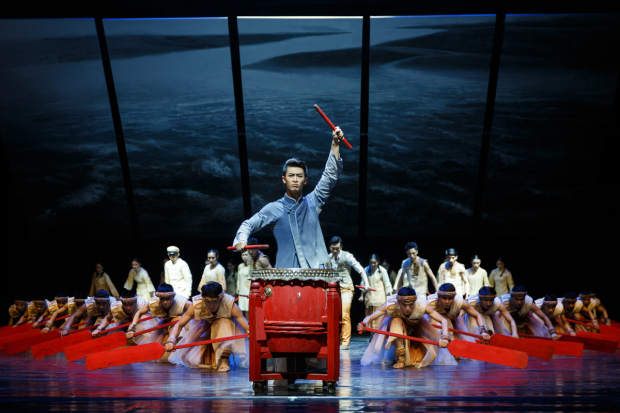Zhou Liya Discusses Dragon Boat Racing and Directing Theater in China
Zhou is the codirector of the new Chinese dance extravaganza set to play Lincoln Center’s David H. Koch Theater.

(Courtesy of the production)
Passionate lovers, sweeping music, and breathtaking stage wizardry set against the backdrop of war: It sounds like a lost Schönberg-Boublil musical. Actually, it is Dragon Boat Racing, a new Chinese dance drama set during the Japanese occupation. A sensation when it premiered in China in 2014, Dragon Boat Racing is set to make its U.S. debut January 7-10 at Lincoln Center's David H. Koch Theater, a venue that is this year doubly blessed with Chinese stagecraft.
Dragon Boat Racing closes just four days before the annual Shen Yun Chinese dance and music spectacular is set to play the Koch. That latter show has become a wintertime fixture since 2006, bringing traditional Chinese dance and music to New York (as well as an army of ticket-sellers to every Bed Bath & Beyond). Its promoters (a group of expatriate Falun Gong supporters) claim on their website, "Shen Yun cannot be seen in China today, where traditional culture has been nearly lost."
Dragon Boat Racing director and choreographer Zhou Liya would likely take issue with that assertion. She's quick to reference her show's deep cultural roots, which reach back to over four decades of Cantonese music. It is performed by Guangdong Song & Dance Ensemble under the auspices of China Arts and Entertainment Group (a large theatrical producing company owned and operated by the Chinese government). This is the ensemble's first time performing in the United States, and they are looking to make a big splash with this new stage event, which seems to defy categorization in the American sense.
Zhou discusses the show's artistic heritage in the following interview (translated from Mandarin), as well as what it is like to be one of the few female stage directors (alongside her codirector, Han Zhen) working in China today.

(Courtesy of the production)
How did you get involved with Dragon Boat Racing?
I was acquainted with Guangdong Song & Dance Ensemble, the creator of this production, and was familiar with Guangdong (the place where the production was born) before I truly got involved in the production. The first time I visited Shawan Ancient Town [where the story is set], I was immediately attracted by its unique architecture and music. Then we decided to begin the creation of this production. Because Shawan is the cradle of Cantonese music, we decided to introduce Cantonese music and Guangdong Musicians through a dance drama based on this place. The dance drama stems from the traditional story of "Three Virtuosos of He Family." He Family is the largest family in Shawan. That's also why the production is set in Shawan.
Why is it important that this story is set during the Japanese occupation of China?
Cantonese music was born during the Chinese Ming Dynasty (1573-1619), took shape in the Qing Dynasty (1875-1908), and reached its peak in the 1920s and 1930s, when the Japanese began to invade China. That is why we've set the production at this time.
What should American audiences expect from the show?
China is a vast land full of diverse customs and cultures. The production focuses on the graceful Guangdong culture. The three cultural "treasures" of Guangdong are Guangdong paintings, Cantonese music, and Cantonese Opera. Guangdong culture is unique. We can make audiences feel the architecture, music, customs, and culture of Guangdong in an overall way through the dance drama.
What is the first thing that you consider when preparing to direct a new work?
The first thing I consider is the type of the new production and whether it conforms to what the director is good at and what the director can be capable of. Then I consider the target audience. Different audiences will lead the production in a different direction.
There are far fewer female directors than male directors in American theater.
That is also true in China.
What kind of obstacles have you faced as a female stage director?
Female choreographers, especially young ones, get strong support in China in many aspects. Apart from some concerns and problems in art, we receive great assistance and support. We are provided with strong platforms to create art productions. We never lack care from the government and an advantageous art creation environment.








